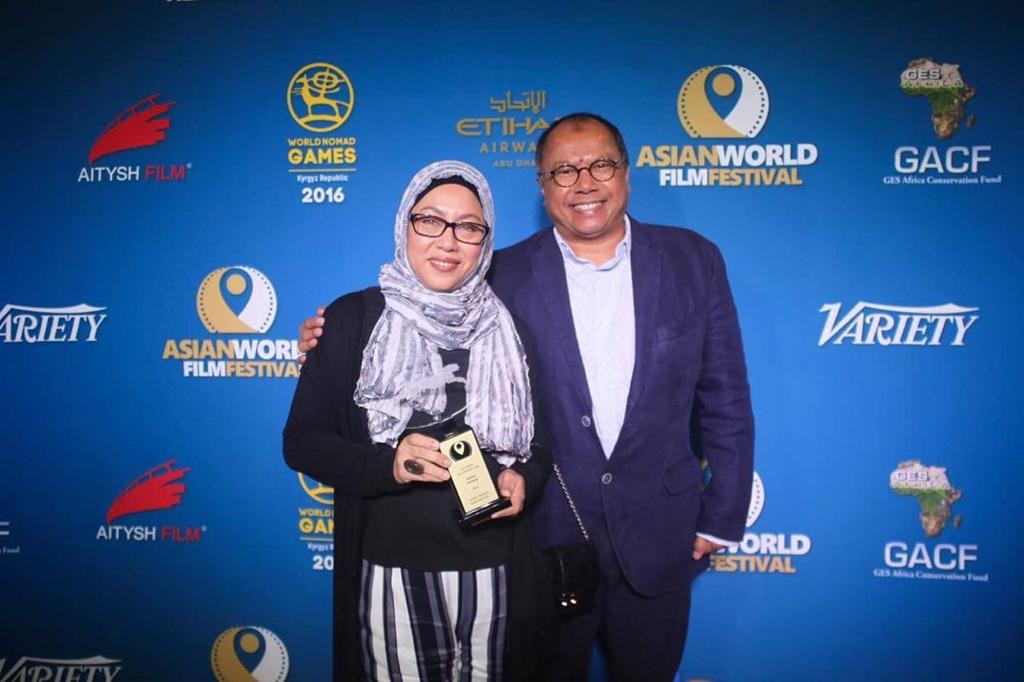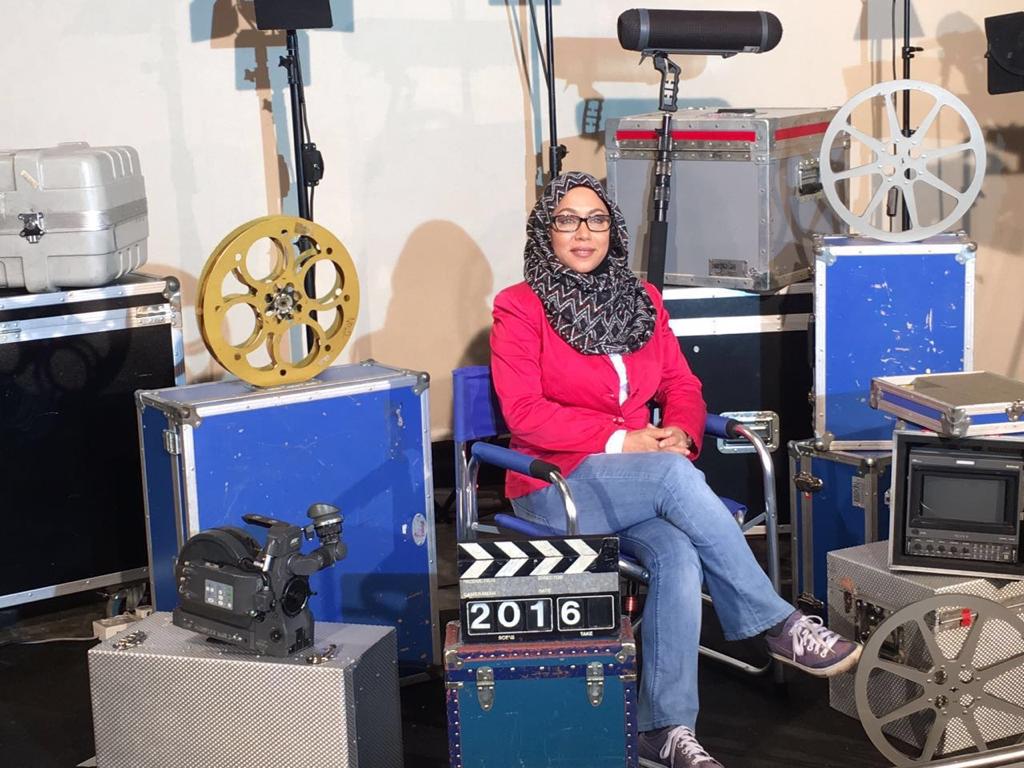Amidst cashier-ringing blockbuster films, audiences yearn for flicks that touch the heart, mind and soul. Filmmaker Tunku Mona Riza has been travelling that route, with rounds of success, especially with the critically acclaimed Redha in the film festival circuits around the world.
Names like Ridley Scott, Spike Jonze, Zack Snyder, Michael Bay, Edgar Wright and Guillermo del Toro have one thing in common – they sure know how to make blockbuster flicks. Well, apart from that, note that all of them had humble beginnings from making commercial films which touch the heart, through simpler presentations.
Sure, it’s one of the usual routes often taken by many successful filmmakers all over the world – it’s easier that way. But the above names are synonymous with mostly commercial fares, crowd pleasers and made purely to aid concessionaires where actually more money are made in cinemas.
However, for someone to hail from the producing product boosting reels, and to fall headlong into a serious, artistic, thought provoking, film-festival headlining making fare takes, well, heck a lot of guts. And our own acclaimed film director Tunku Mona Riza has plenty of it.
The Heart of the Journey
As she prepares her new venture, she sat with her husband, Haris Sulong, with NMH to talk about her journey into the filmdom and the experience that brought her into making Redha (Beautiful Pain), a multiple award winning fare that made the rounds since 2016.


The film, about parents dealing with their autistic son, an affliction that they know little about, won applauds, and rave reviews from all around the film festival circuits including GUKIFF International Kids Film Festival in SEOUL; winning the Merit of Awareness Award at LA Awareness Film Festival, winning AWFF ‘Jury Award – Courage in Storytelling’ at Asian World Film Festival LA and chosen as the Opening Film (Official Selection) at the ASEAN Film Festival held in Geneva, to name a few.
All in all, there were about 11 international and seven local awards, making it the most awarded Malay language Malaysian Film in Malaysia, not to mention that it was also chosen as Malaysia’s contender at the 89th Academy Awards and 74th Golden Globe Awards.
(The list is too long to be fitted here, readers can seek it out at the movie database, Imdb as well as the official site.)

If the above cited filmmakers mostly brought their commercial gears into making explosive blockbusters, what made Tunku Mona to risk it with what would be an art-house production? Spielberg took more than a decade after letting sharks, archeologists and aliens to invade our consciousness before unleashing Schindler’s List.
Salaam Bombay
Tunku Mona, who was thriving in the commercial enterprise, having worked with a few production houses and started her own venture, was already aware of the appeal of the commercial fares and the often-neglected art-house fares, but one film really affected her – as it did the whole world in 1988 – Mira Nair’s Salaam Bombay, tilted her towards the latter direction.
Good to note, however, that commerce got her started. Pure commerce.
During her college days in the late 80s, she joined other college students performing in print and TV commercials mainly for the dough to support her studies. But what went on behind the camera began to intrigue her. It was to be her destination.
It has to be, considering the agent who got her in, then turned around and asked her to help with casting. The journey, thus, started.
“From there the exposure began,” said Tunku Mona, then adding, rather quizzically, “come to think of it, I never went for any job interviews.”
Her ad agency work took her places and allowed her to take on various responsibilities, which included the casting and working on the talents’ comp card (sort of like model’s CV), then moving on, including onto other agencies upon invitation, as production assistant, then line producer.
How It Began
The companies are wide, internationally recognized such as Lowe Lintas, Naga DDB Needham, VHQ and Yarra Films Malaysia. Then, in 1999, she started Current Pictures Sdn Bhd. Haris, was at that time with a different production company.
The contemplation on going on her own started, when she was stuck in between production house, Water Films Singapore, of which, she was handling the Malaysian chapter (Water Films Sdn Bhd). The Singapore company was already picking bones with its Hong Kong chapter, and soon Tunku Mona found that her intended Malaysian based content would just end up drowned in the dividing straits of indifference.
With the establishment of Current Pictures Sdn Bhd (7 July 1999), she was ready to flex her creative wings. While at it, she also hired her husband who was already making commercial films, to help her with the directorial duties, alongside other hires.
Despite she herself having directed commercials, she wanted formal completion of understanding the entire craft of filmmaking and hence, the trip to the famed New York Film Academy. “I had always wanted to make feature films,” she noted. “But what struck my mind was…if I ever become a film director, I want to do a film like Salaam Bombay. First, because it was (a powerful film) by a female director. Then, the use of real people from the street, with a brilliant story”.
Intrigued
Back home, when making a commercial for Bank Simpanan Nasional (involving the Orang Asli), someone passed a manuscript that has not blossomed into a book yet. Tunku Mona was intrigued, and it was also around the time when the satellite station Astro, required content and acquired this film and positioned it as Super Telemovie. The film, Uri, was her first step into the feature length film, and was already dealing with heavy subject of soul searching journey of a character who finds out that he was actually an orphan.
Next, she directed Eman Manan in another Super Telemovie, Parit Jawa, which caught the notice of many with the hard hitting family story concerning the bond between the members divided by greed for inheritance, and their ties with the matriarch of the family.
By then, she knew that she has a film that need to be launched – on big screen nevertheless. Thanks to her acquaintance with BSN from the TV commercials she has made for the bank, she was offered to pitch to the Bank’s Ceo and board members which was managing a government fund called Creative Loan. She pitched the story about an autistic boy – a subject that is very close to her heart.

Indeed, after when the filming was going on, one of her actors, Namron, asked her point blank if indeed she was aiming for film festivals and awards with the movie.
“I told him that I was doing this for the community,” she said. That is, she was out there for a good two years getting to know that very special group of people, and her own colleagues had children with autistic issues.
She realized that awareness can be made. “I realize that this is something that need to be brought forward. For autistic children, you can’t tell from the face, unlike child with Down syndrome. And when you can’t tell, the judgment and perception differ.”
Mostly, she was wanted to tell the story of the family of these afflicted souls, on how they themselves have to deal with what would be an uphill task, wading through negative preconceptions, associated taboos and the indifferences of many.


In fact, NMH‘s Editor-In-Chief, Hasnah Abdul Rahman, saw the draft of this article and said: “Tunku Mona did for the autism community in Malaysia, no, the world, what very few people could do – get us all to relate to the story with our own experiences.
“I watched the movie five times! Each time I cried buckets. I brought my family, my friends from the autism community and those who want to know more about Autism,” said Hasnah who has two sons under the autism spectrum and has been creating autism awareness in a big way via NMH and her social media postings.
Indeed, upon finishing the feature Tunku Mona was not even thinking about any film festivals, as prodded by her actor, but it was Finas itself which mentioned about Cannes Film Festival. “So, a handful of us went, paid for our own fares,” she said. She was confident that the film could garner some attention. “The film may not have done well; but it created the awareness, the related community is happy. That mattered.”
Cannes
At the Cannes Film Festival, Tunku Mona did her part, presenting the film at Marche du Film (Film Market) and talking about the central issue. It was a small crowd and naturally she was a trifle disheartened, thinking that perhaps the journey is ending there. But lo and behold, a group of folks from the Philippines requested to see the film in full and later invited her to screen the film at the festival in their country as well.
As recognition came pouring in, Tunku Mona went on with her usual rounds of making commercials and the pandemic sort of slowed down whichever big plans that were afoot. Yet, she has managed to wrap up the shooting of the second theatrical film, Rain Town – in Cantonese nevertheless set in Taiping (where the title came from) and set to release next year.
“When shooting this, a journalist from a Malay media asked how many awards was I aiming for this film,” she recalls. “I said, I had forgotten about the awards. I just want to do this film the best way I could.”
In the midst of fanfare with the explosive success of Mat Kilau and whichever racing flicks that careened across our film circuits, it is heartening to note that filmmakers like Tunku Mona Riza kept Malaysian films grounded, and, most importantly, told stories that had heart. Stories that are meant to be told, not aiming at award ceremonies per se. Stories that everyone can relate to, notwithstanding the language or culture. Stories that every Malaysian can be proud of. – NHM

About the writer: Rakesh Kumar is a writer, scriptwriter, and film aficionado, who is four years and ten months clean and sober. And counting. The points expressed in this article are that of the writer and do not necessarily reflect the stand of the NMH.
Facebook Comments